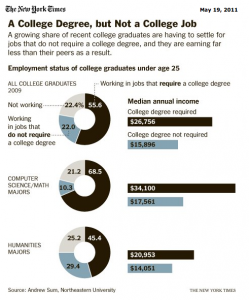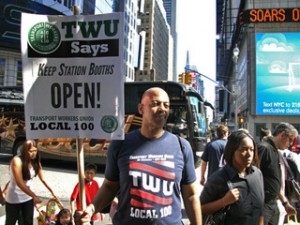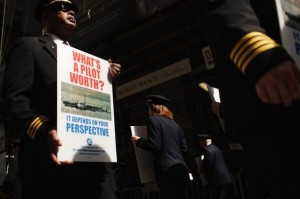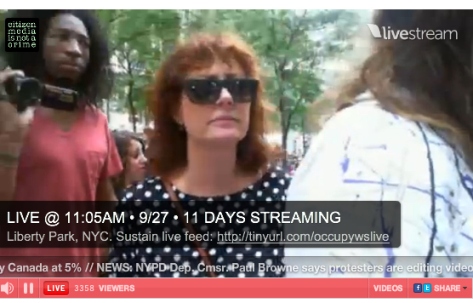It seems the American recession has really hit some people where it hurts, in their wallets! As of September 2011, the unemployment rate in the country was 9.1%. Due to this rate, people are constantly being laid off while others are unsuccessful in their attempt to obtain a job. Without a steady income, shopping, especially for clothing, might not be a person’s priority. Continue reading
Continue reading
Category Archives: Survey
Budget Cuts and Schools: Citywide vs Neighborhood Effects
When President Obama announced the No Child Left Behind State Waiver Initiative, it seemed as though New York City public schools may be getting a break.
However, one fact has not changed. Schools are being asked to increase learning standards, offer more programs, and close the achievement gap, all while their budgets get systematically cut.
For grad students, do work and study mix?
One thing is certain: grad school is getting more expensive. Between the 2003-04 and 2007-08 school years, the average annual price of grad school at public institutions rose from $25,700 to $29,000. Some schools’ rates are rising faster than inflation, and many professional institutions are charging 60% more than they did ten years ago.
Attending graduate school is a big decision, now more than ever. And, after deciding to go for that M.A. or M.B.A., one of the next questions on many students’ minds is “Should I work during school?” Continue reading
Does The Economy Affect Your Sex Life?
They say money is sexy. So then what happens to your bed when the economy collapses?
Obviously it’s harder to take a girl out when you are flat broke. Especially if you are too old school to split the bill. Not to mention the fact that you moved back to your parents’ since you couldn’t find any job after you graduated. And most girls aren’t impressed by basements.
But even for those of you who are involved in a relationship and don’t need to spend their salary in drinks and dinners any more, the economic recession might have been a synonym of sex life recession.
In fact, massive numbers of layoffs, a big drop in the stock market and declining home values are just so many stressors. And while the couple’s worrying about money, mortgage and job stability, sex drives may decrease…
Here’s a short survey that can help me understand how the economy interacts with sex life. Thank you for filling it out!
What has contributed to the evolution of Occupy Wall Street?
When it began on Sept. 17 in Lower Manhattan’s Zuccotti Park, Occupy Wall Street was a disorganized, unfocused group that was the subject of ridicule on both sides of the economic debate. Now, exactly two weeks later, it has become a legitimate national movement. What changed and how?
At its inception, the protest had a vague theme of opposition to tax rates favoring the wealthiest people in the nation, an issue that was thrust into the national spotlight when billionaire Warren Buffett wrote an op-ed piece for The New York Times, in which he railed against the fact that he paid a lower tax rate than his secretary. This led to President Obama’s proposal of the “Buffett rule,” requiring those with an annual income of $1 million or more to pay a higher tax rate than those with middle-class incomes.
As Occupy Wall Street has progressed, a series of events surrounding the protests has occurred, appearing to result in the “legitimization” of the movement.
Among those instances:
– It’s not just the neo-hippies anymore. Multiple unions have joined the Occupy Wall Street protesters in the past week, including transit workers and airline pilots worried about their pensions, bringing with them an element of organization to the event.
– First responders to 9/11 also joined the fight, angry over the lack of government support in paying medical expenses for illnesses developed from working in the wreckage of the World Trade Center.
– A rumor that rock band Radiohead would play at the protests this week turned out to be just that, nonetheless drawing people that might not otherwise have gone. The group did post a message of support for the protesters on its Facebook page.
– High-profile supporters like actress Susan Sarandon and documentary filmmaker Michael Moore showed up in an effort to help the protesters find their way, encouraging them to stay strong and make their message clear.
– “Occupy” protests have started in cities across the U.S. in solidarity with the original.
– Allegations of NYPD brutality against Wall Street protesters have become impossible to ignore, culminating in this weekend’s march to the Brooklyn Bridge, during which protesters are claiming that police misled and trapped them in order to make over 700 arrests.
Whatever the reason, there is no doubt that Occupy Wall Street has developed into a major operation and will not dissipate until there is some form of acknowledgement from the government.
Have you changed your opinion about Occupy Wall Street?
Workforce Experience & The Economy: A Survey
President Obama’s latest weekly YouTube address focuses on the economy… again:
The president doesn’t seem terribly pleased with his congressional colleagues, does he? He urges Congress to “get their act together” and pass The American Jobs Act proposed three weeks ago.
View more White House documents

With a national unemployment rate still north of 9% and the government set to release its September monthly employment report next week, jobs remain a central element in many economic conversations.
And perhaps no group is being hit harder than recent college grads… us!
So let’s talk about it! We’ve all clearly managed to survive so far, but how did we do it? Perhaps some people got creative… or maybe capitalized on an apparently economically viable hereditary characteristic (this is an option?!)
Please take a moment to answer the following brief survey about your personal experience in the workforce. (OR CLICK HERE)
In the next few weeks, technology permitting, the fascinating results will be discussed… titillating insights gleaned… and maybe the future of the Western economic system will be saved. Maybe…
Thanks for your participation!
(http://bit.ly/osODgt)
Headhunters: How Useful Are They?
There’s little arguing the difficulty of the current job market. But in times of trouble, it’s not uncommon for people to look for a bit of help.
And when it comes to employment, the first place most people will turn to are employment agencies, known colloquially as headhunters.
Headhunters and recruiters are a large industry. A simple google search of the employment agencies just in New York City returns 601,000 results.
 But employment agency is a blanket term for these businesses. There a several different kinds of operations that help people and employers get together, as described in a helpful article on About.com.
But employment agency is a blanket term for these businesses. There a several different kinds of operations that help people and employers get together, as described in a helpful article on About.com.
A contingency employment agency hinges on contingency – in other words, no one gets paid if you don’t get a job. This is used by both employers looking to fill a position, or a job applicant who wants to send their resume out among a wider net.
A retained search firm is used exclusively by employers, and to fill a specific position. If you ever had dealings with them, most likely they sought you out.
A headhunter/recruiter is a person who you work personally with on your job search. Either they will approach you about a position they want to fill, or more likely, you will approach them when looking for help on your job search.
Temporary agencies help people find temporary positions. They are used often for seasonal employment, or for those looking to find a temporary position that may grow into a permanent one.
That last agency especially is important in a time when any employment is difficult to find. In fact, headhunters of all kinds look down right desirable these days. So much so that numerous websites list ways to woo a headhunter to your cause.
But employment agencies are often industry specific, and do charge a fee. So it begs the question, is the price actually worth it? Or would someone be better off just dealing with the job market on their own?
This is where help is needed.
If you have ever used a headhunter, a temp agency, or even just had someone point you in the way towards a job, please fill out this survey. Even if you haven’t used an employment agency, it’s good to know why you never sought one out.
Jobs, the Economy, and YOU
Jobs, the Economy, and YOU
With nonstop reminders of how dismal the economy is and all those reports on the frozen job market, here are a few questions to hear from you, the individual who might be the one to feel the effects of all the above.
Please take a second and take this survey and share your thoughts.
Is the American Dream killing America?
Get born. Get an education. Get a job. Get married. Get a home. Get a promotion. Get a vacation. Get retired. Get dead. Got life? Continue reading












